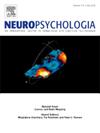人类空间记忆中异中心和自我中心认知图的行为研究。
IF 2
3区 心理学
Q3 BEHAVIORAL SCIENCES
引用次数: 0
摘要
空间记忆是一种基本的认知功能,它使人类和其他物种能够对环境中物品的位置进行编码和回忆。人类采用多种策略来支持空间记忆,包括使用认知地图。认知地图是对环境的心理表征,它沿着两个或多个连续的维度组织其内容。在非中心认知地图中,这些维度形成了参照环境的笛卡尔坐标系统。在以自我为中心的认知地图中,维度形成了一个以主体为中心的极坐标系。为了更好地理解人类如何利用非中心和自我中心的认知地图进行空间记忆,我们进行了一项行为研究,设计了一项新任务,直接和明确地评估这两种类型的认知地图。在编码期间,参与者在虚拟环境中导航,并在不同的位置遇到物体。在回忆阶段,参与者的目标是在抽象的非中心和自我中心坐标系中记住这些位置。我们的研究结果表明,物体和环境之间的关系,比如它们到边界和角落的距离,与非中心记忆性能有关。物体和参与者之间的关系,包括它们与参与者起始位置的距离和方向,与自我中心记忆的表现有关。记忆过程中的空间反馈支持非中心域和自我中心域的表现,但不支持跨域的表现。这些发现与异中心和自我中心的认知地图作为(部分)独立的空间记忆系统运作的概念相一致,每个系统专门处理特定类型的空间关系。本文章由计算机程序翻译,如有差异,请以英文原文为准。
Behavioral investigation of allocentric and egocentric cognitive maps in human spatial memory
Spatial memory is a fundamental cognitive function that enables humans and other species to encode and recall the locations of items in their environments. Humans employ diverse strategies to support spatial memory, including the use of cognitive maps. Cognitive maps are mental representations of the environment that organize its content along two or more continuous dimensions. In allocentric cognitive maps, these dimensions form a Cartesian coordinate system referenced to the environment. In egocentric cognitive maps, the dimensions form a polar coordinate system centered on the subject. To better understand how humans employ allocentric and egocentric cognitive maps for spatial memory, we performed a behavioral study with a novel task designed to directly and explicitly assess both types of cognitive maps. During encoding periods, participants navigated through a virtual environment and encountered objects at different locations. During recall periods, participants aimed at remembering these locations in abstract allocentric and egocentric coordinate systems. Our results show that relationships between the objects and the environment, such as their distance to boundaries and corners, were associated with allocentric memory performance. Relationships between the objects and the participant, including their distance and orientation to the participant’s starting position, were linked to egocentric memory performance. Spatial feedback during recall supported performance within allocentric and egocentric domains, but not across domains. These findings are compatible with the notion that allocentric and egocentric cognitive maps operate as (partially) independent systems for spatial memory, each specialized in processing specific types of spatial relationships.
求助全文
通过发布文献求助,成功后即可免费获取论文全文。
去求助
来源期刊

Neuropsychologia
医学-行为科学
CiteScore
5.10
自引率
3.80%
发文量
228
审稿时长
4 months
期刊介绍:
Neuropsychologia is an international interdisciplinary journal devoted to experimental and theoretical contributions that advance understanding of human cognition and behavior from a neuroscience perspective. The journal will consider for publication studies that link brain function with cognitive processes, including attention and awareness, action and motor control, executive functions and cognitive control, memory, language, and emotion and social cognition.
 求助内容:
求助内容: 应助结果提醒方式:
应助结果提醒方式:


